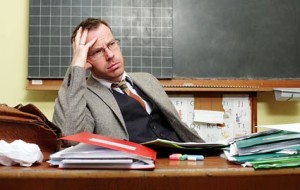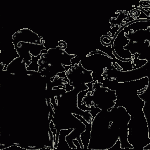 Have you ever doubted you’re doing the right thing? If all your time spent teaching was actually worth it? If you were really having an impact on students? Does this profession provide you a way to light others’ candles? Or do you find you’re burning so much that you’re doing nothing but burning your candle on both ends?
Have you ever doubted you’re doing the right thing? If all your time spent teaching was actually worth it? If you were really having an impact on students? Does this profession provide you a way to light others’ candles? Or do you find you’re burning so much that you’re doing nothing but burning your candle on both ends?
I asked myself these questions one day in 2011. I’d been planted on my couch for 3 consecutive days, and I wasn’t moving. I had been emotionally paralyzed by a variety of things, and the last thing I wanted to do was go into school that Monday.
My fiancée sat there, simultaneously helping and worrying about me. I told her, amidst a mass of choked-back tears, that I had to find a new job. It’s not that I hated my job as a teacher. In fact, I loved it! It’s just that the job had taken its emotional toll on me. Instead of lighting educational torches, my metaphoric candle had become torched at both ends and was now extinguished.
That year, my 5th in the profession, was when my world broke. There were many things to be happy about, as I had finally reached the light at the end of the tunnel for my M.Ed. in Educational Leadership and just needed to finish my principal’s practicum. But that summer, the administration moved me to a new school. Then they made me a traveling teacher. Then they gave me two bears of a curriculum – the first to teach about the geography, culture, religion, and history of Russia, India, China, Japan, and the Middle East to 10th graders; the second to teach American government to the lowest juniors and seniors in our school. The only home I was to have that year was our “planning center,” which, in the midst of a contract year, is probably the last place any teacher seeking sanity would find solace.
In addition to this, I faced several personal problems. An investment that I’d made with a friend had crashed and burned. My grandmother, father, and brother all had medical complications and interred long-term hospitalizations. Another brother faced crime accusations. I lost a best friend in a car accident that year. One of the first students I ever bonded with died of an overdose. It seemed I couldn’t save myself from a meltdown.
I tried to develop some type of regular regiment to offset the evils that were mostly out of my control. I began working out in the morning with several other principals at the high school, but I soon found the late nights working on my degree, my new course work, and helping my family with their problems were cascading into some severe sleep deprivation. The early morning workouts soon turned into last minute efforts to exercise, and I soon abandoned them.
A few weeks later (with some of the struggles behind me), I tried to rekindle the flame and make my way back to the gym, but I found that just being at school for 16 hours a day was making me desperately sick. I was walking into the school and running straight to the bathroom, vomiting in the stall almost until students’ reporting time. School used to be a place to give me reason to live, and now it was slowly killing me.
However, like most teachers facing similar problems, I neglected treatment. I figured this was just a phase and that I could work through the distress. In fact, many students and colleagues had worse problems than I had, so I plodded on. Soon the days began to get better, and I started to find a routine (even though it didn’t have room for exercise). Just then, I woke up one morning and couldn’t get out of bed. My mind and my body had shut itself down. I literally couldn’t walk without being dizzy and falling over. Teaching was killing me.
I picked up the phone one day in November and called our administration; I spoke to the principal who hired me. I told him about all the variables that had made me an unsolvable equation, and I told him that I was preparing my resignation letter. It was amazing to hear the words out of my mouth, because just 5 years earlier I had come to do a 180-degree spin on pursuing and participating in this prolific profession. He reminded me of this, and told me to take a few days off to seek the proper help.
I had never been to therapy before, so I had many hesitations about participating in it. However, after a few moments of silence, I spent most of my time gushing about the wall of fire that had been building behind the dam in my heart. With the fire came tears. I walked home the remnants of a broken man, but at least I was able to walk again. I met with my therapist three more times that week. She told me to work on myself, because I wasn’t a candle – I was a well that had run dry, and now it was time to replenish myself.
That meant no writing lesson plans. No working through the piles of discipline. No helping family members with their anguish. No tackling the other burdens I would always place squarely upon my shoulders. For the first time since I was a teenager – I had to do things for and take care of myself. It was much more difficult than I thought.
Why? Quality teachers (like me and you) want each and every student to leave our classroom infinitely better than the day they entered it. We work ourselves to no end to get them there, spending one-on-one time before and after school. We call home incessantly. We try to make creative, captivating, and cultivated lessons. We seek to entertain and educate. We want each kid to leave that day with something gained and something to smile about. Our job is to care about everyone, all the time. In doing this, we set our own expectations to a superhuman level.
I stopped pretending to be superhuman and took the week to replenish my well. When I was able to return to the classroom, I kept my expectations in check. It was that moment when I started to see results. Once the clouds of a billowing smoke receded, I was greeted by a comforting, refilling rain. I was replenished.
As I approached school that last day of the school year, I sat in the parking lot a bit longer than I had in a while. I didn’t feel sick anymore. I didn’t try to deal with every problem all at once. I didn’t have unrealistic expectations. I learned that I couldn’t save every kid, but I could help at least a few of them each and every day. I was satisfied with that.
There was one student in particular that I didn’t know I’d helped. He was in one of my classes, and, at the end of class he ran out the door and into the restroom. I followed him in, concerned, because he was a rather quiet young man who suffered from some social issues. I cautiously entered the restroom, and what I heard from the stall – a combination of sobbing, vomiting, and attempts to catch a breath – were all too familiar to me.
“Oh Lord,” I thought. “My worst nightmare’s come to life – I’ve turned one of the students into me.”
I gently approached him, asking what I could do to help, and, surprisingly, he started laughing.
“Why…” I asked “…in the world are you laughing?”
He came out of the stall with a collapsed face – but a bright smile and gave me a big hug, took a step back, and said, “You’ve changed my life. I’ve never been able to participate in a class because I just feel uncomfortable. But you made this class interesting, fun, and a place where we all feel comfortable.”
I explained that this had been my worst year, and though I appreciated his comments, I’d told him I wished I could do more for him and his classmates.
His reply is one I’ll never forget: “If you did any more than what you’ve already done, you’d be superhuman.”
I’d learned a lot that year, but most of all I’d learned that my impacts have overwhelmingly positive. Since then, I’ve now written letters of recommendation for more than 25 of the 125 students. I have a fantastic young lady from Stephen’s class serving as a senior intern (she, too, wants to be a history teacher). The captains of the baseball, volleyball, and baseball teams each honored me as a distinguished educator. The candle has been retired, and the well has been replenished.
Have you ever doubted you’re doing the right thing? If all your time spent teaching was actually worth it? If you were really having an impact on students? Does this profession provide you a way to light others’ candles? Or do you find you’re burning so much that you’re doing nothing but burning your candle on both ends?
I don’t anymore.




